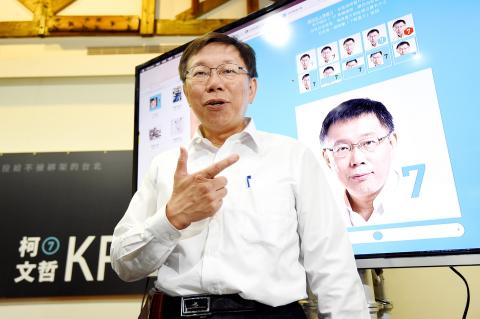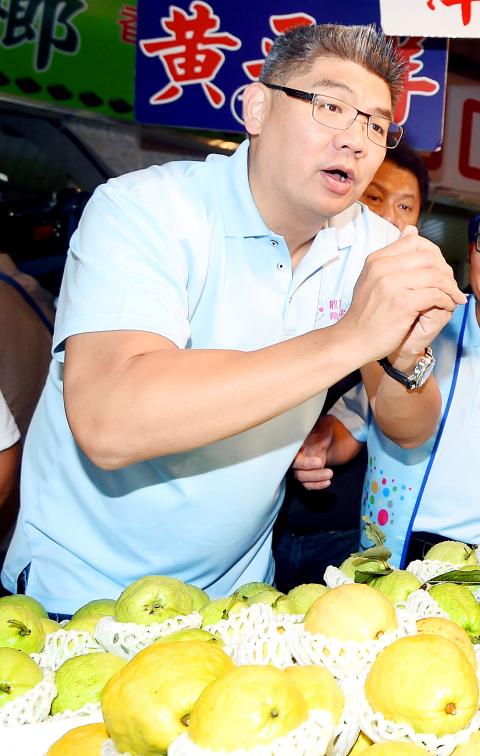A victory by independent candidate Ko Wen-je (柯文哲) in the Taipei mayoral election would hamper cross-strait relations and restrict the role that the city plays on the international stage because of his “denial” of the “1992 consensus,” Chinese Nationalist Party (KMT) spokesman Charles Chen (陳以信) said yesterday.
Chen made the remarks one day after China’s Taiwan Affairs Office (TAO) Minister Zhang Zhijun (張志軍) said that he hoped “everyone” would recognize the “1992 consensus” in response to questions about Ko.
The “1992 consensus,” a term that former Mainland Affairs Council chairman Su Chi (蘇起) admitted to making up in 2000, is an alleged agreement reached by Taipei and Beijing that there is “one China, with each side having its own interpretation.”

Photo: George Tsorng, Taipei Times
Whether Beijing accepts the idea has always been viewed with suspicion in Taiwan, since it has never recognized the existence of the Republic of China.
Many Taiwanese dispute that such a consensus was reached.
According to a Central News Agency (CNA) report from Beijing on Tuesday, Zhang commented on the elections on Saturday.

Photo: Chu Pei-hsiung, Taipei Times
The TAO has been closely watching election developments and looks forward to the results on Saturday night, Zhang said, according to the CNA report.
Zhang said whatever the outcome may be, he was optimistic about the future of cross-strait relations because both sides aspire for peaceful development.
According to the report, Zhang appeared to refrain from commenting directly about Ko when he was asked about prospects of interaction between Ko and China if he is elected, saying that Shanghai and Taipei have maintained good relations and cooperation, and that the question can only be answered after the elections.
Zhang was then asked whether China hoped Ko would recognize the “1992 consensus,” and Zhang replied that the “1992 consensus” is the basis of cross-strait relations and that he hoped that it could be accepted by everyone to ensure cross-strait relations would continue to move forward.
When asked to respond to Zhang’s comments on Tuesday, Ko told reporters that his main concern was “what is the content of the ‘1992 consensus?’”
Ko said he was opposed to putting people in a pigeonhole by asking them whether they like something or not without telling them what it is.
“At least at this moment, the Republic of China is my bottom line,” Ko said.
Although there is no need to involve cross-strait issues in the election, Ko said he would always air his views on matters of public interest.
Ko said he was confident about his understanding of China and the Chinese because he has visited the country 18 times.
“China is poised to become the word’s largest economy and geographically, it close to Taiwan. Whether Taiwan likes it or not, China is [a country] Taiwan needs to engage with,” he said.
Ko said he supports continuous cross-strait exchanges and signing the trade in services and goods agreement, but is also concerned about the lack of transparency in such negotiations and worries that these cross-strait exchanges are only benefiting the privileged few, rather than the general public.
If he is elected, Ko said the city government will continue to hold the Taipei-Shanghai City Forum, an annual event first held in 2010, with the same “frequency and depth” to observe “policy continuity.”
When it comes to further engagement, Ko said his policy would be guided by four principles: that both sides would “understand each other better, be charitable to each other, respect each other and cooperate with each other.”
Meanwhile, Chen issued a press release saying that the independent candidate’s denial of the existence of the “1992 consensus” would have “grave consequences” for Taipei if he were elected mayor.
“Just imagine how a Taipei mayor who refuses to accept the ‘1992 consensus’ can develop cross-strait city exchanges. How can this mayor continue to advance exchanges between Taipei and Shanghai under the Taipei-Shanghai City Forum? How can he elevate the relationship between Taipei and Hong Kong?” Chen said.
As the 2016 World Design Capital, Taipei is to stage a series of design-related events that year and the following year, it is to host the World University Games, Chen said.
“Could Ko’s rejection of the ‘1992 consensus’ result in a boycott of these events by mainland China?” Chen said.
The TAO issued a statement later on Tuesday evening saying that China never makes comments about candidates running in Taiwanese elections, while reiterating the importance of the “1992 consensus” as the basis for cross-strait relations.
At a press conference yesterday morning, TAO spokesperson Ma Xiaoguang (馬曉光) said that the core element of the consensus reached by the Straits Exchange Foundation and China’s Association for Relations Across the Taiwan Strait following their meeting in Hong Kong in 1992 is that “each side of the [Taiwan] Strait expresses verbally its insistence on the ‘one China’ principle.”

‘TAIWAN-FRIENDLY’: The last time the Web site fact sheet removed the lines on the US not supporting Taiwanese independence was during the Biden administration in 2022 The US Department of State has removed a statement on its Web site that it does not support Taiwanese independence, among changes that the Taiwanese government praised yesterday as supporting Taiwan. The Taiwan-US relations fact sheet, produced by the department’s Bureau of East Asian and Pacific Affairs, previously stated that the US opposes “any unilateral changes to the status quo from either side; we do not support Taiwan independence; and we expect cross-strait differences to be resolved by peaceful means.” In the updated version published on Thursday, the line stating that the US does not support Taiwanese independence had been removed. The updated

‘CORRECT IDENTIFICATION’: Beginning in May, Taiwanese married to Japanese can register their home country as Taiwan in their spouse’s family record, ‘Nikkei Asia’ said The government yesterday thanked Japan for revising rules that would allow Taiwanese nationals married to Japanese citizens to list their home country as “Taiwan” in the official family record database. At present, Taiwanese have to select “China.” Minister of Foreign Affairs Lin Chia-lung (林佳龍) said the new rule, set to be implemented in May, would now “correctly” identify Taiwanese in Japan and help protect their rights, the Ministry of Foreign Affairs said in a statement. The statement was released after Nikkei Asia reported the new policy earlier yesterday. The name and nationality of a non-Japanese person marrying a Japanese national is added to the

AT RISK: The council reiterated that people should seriously consider the necessity of visiting China, after Beijing passed 22 guidelines to punish ‘die-hard’ separatists The Mainland Affairs Council (MAC) has since Jan. 1 last year received 65 petitions regarding Taiwanese who were interrogated or detained in China, MAC Minister Chiu Chui-cheng (邱垂正) said yesterday. Fifty-two either went missing or had their personal freedoms restricted, with some put in criminal detention, while 13 were interrogated and temporarily detained, he said in a radio interview. On June 21 last year, China announced 22 guidelines to punish “die-hard Taiwanese independence separatists,” allowing Chinese courts to try people in absentia. The guidelines are uncivilized and inhumane, allowing Beijing to seize assets and issue the death penalty, with no regard for potential

‘UNITED FRONT’ FRONTS: Barring contact with Huaqiao and Jinan universities is needed to stop China targeting Taiwanese students, the education minister said Taiwan has blacklisted two Chinese universities from conducting academic exchange programs in the nation after reports that the institutes are arms of Beijing’s United Front Work Department, Minister of Education Cheng Ying-yao (鄭英耀) said in an exclusive interview with the Chinese-language Liberty Times (the Taipei Times’ sister paper) published yesterday. China’s Huaqiao University in Xiamen and Quanzhou, as well as Jinan University in Guangzhou, which have 600 and 1,500 Taiwanese on their rolls respectively, are under direct control of the Chinese government’s political warfare branch, Cheng said, citing reports by national security officials. A comprehensive ban on Taiwanese institutions collaborating or